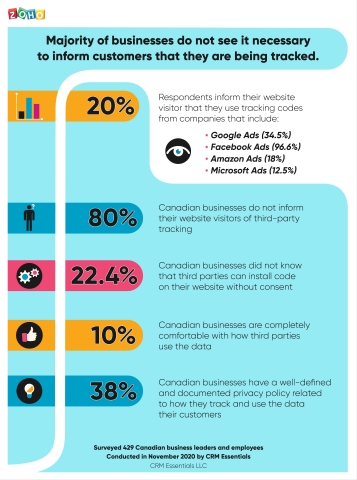Only 38% of Canadian businesses have a well-defined, documented policy for customer data privacy
 Data privacy and online surveillance transparency continue to be serious issues for Canadians. A newly released survey reveals that a vast majority of businesses in the country do not inform their website visitors of third-party tracking.
Data privacy and online surveillance transparency continue to be serious issues for Canadians. A newly released survey reveals that a vast majority of businesses in the country do not inform their website visitors of third-party tracking.The November 2020 study – conducted by CRM Essentials and sponsored by Zoho – surveyed 429 Canadian business leaders and employees and found that only 20% of respondents inform their website visitors that they use third-party tracking codes.
The data being collected and leveraged by third-party tracking can include IP addresses, behavioural data, social activity, transactional data, feedback, application usage data, and even information about a user’s devices and browsers. While this data is most often used for the purposes of personalizing ads, other uses can include developing analytics about user behaviour, allowing social media sharing, and more.
Marketing Technology News: Kelly Breslin Wright joins Cien.ai Board of Advisors
“Given the importance of data privacy and transparency, it’s quite surprising that so few Canadian businesses inform their website visitors about the third-party tracking on their sites,” said Chandrasekar LSP, Product Evangelist at Zoho. “Especially at a time when data privacy laws are in a state of transition in Canada, this is a missed opportunity for businesses to take data privacy into their own hands and further establish trust with their customer base. I would expect every business to highlight their website tracking policies.”
Key survey findings:
- Only 38% of Canadian businesses have a well-defined, documented policy for customer data privacy that is strictly applied.
- Only 20% of respondents inform their website visitors that they use tracking codes from third-party companies.
- As many as 22.4% of Canadian businesses did not know that third parties can install code on their website without consent.
- Only 10% of Canadian businesses are completely comfortable with how third parties use the data.
- Only 21.6% of Canadian businesses say that third-party companies have done a good job of explaining what they use their customer data for.
- The most common purposes that Canadian businesses allowed third parties to install code on their websites were:
- Sharing content on social media (26.6%)
- Gathering analytics on who is consuming content (23.1%)
- Tracking advertising campaigns (21.4%)
- Tracking affiliate relationships for transactions (15.2%)
- Plugins to perform functions like SEO, security comment capture, and more (13.8%)
Marketing Technology News: Popular Pays Announces New Shopify Integration
Canada Compared to the United States
Almost twice as many Canadian businesses surveyed (22.4% CDN vs. 11.4% U.S.) said that they were unaware that third parties could install coding on their website without their consent as compared to U.S. businesses. Additionally, American businesses are more than three times as likely (31.8% U.S. vs. 10% CDN) to be very comfortable with how third parties use their customers’ data.
Canada vs. the U.S highlights:
- Canadian businesses are almost twice as likely not to be aware of third-party software they’ve deployed on their sites.
- U.S. businesses are more than three times more likely to be very comfortable with their customer data being accessed by companies they do not have a direct relationship with.
- U.S. businesses are more than twice as likely than their Canadian counterparts to spend at least 50% of their marketing budget on digital ad platforms.
- U.S. businesses are 88% more likely than Canadian businesses to say digital ad platforms are a primary factor in meeting company sales objectives.
“The lack of data surveillance transparency is similarly bad on both sides of the border, however, U.S. businesses have a better sense of how their third-party data is used, especially when it comes to using that data for marketing,” said Brent Leary, co-founder and partner of CRM Essentials. “Both U.S. and Canadian businesses may want to consider a privacy commitment similar to Zoho’s, which states that it will not share or sell visitor or customer data. Even if they find it difficult to reach that level, they can and should do much better than they are today.”
Marketing Technology News: Onfido Announces New Identity Verification Solution on Salesforce AppExchange










